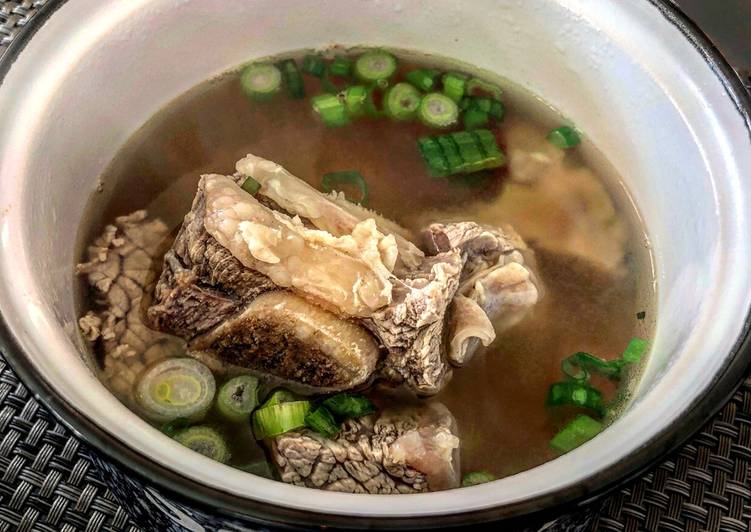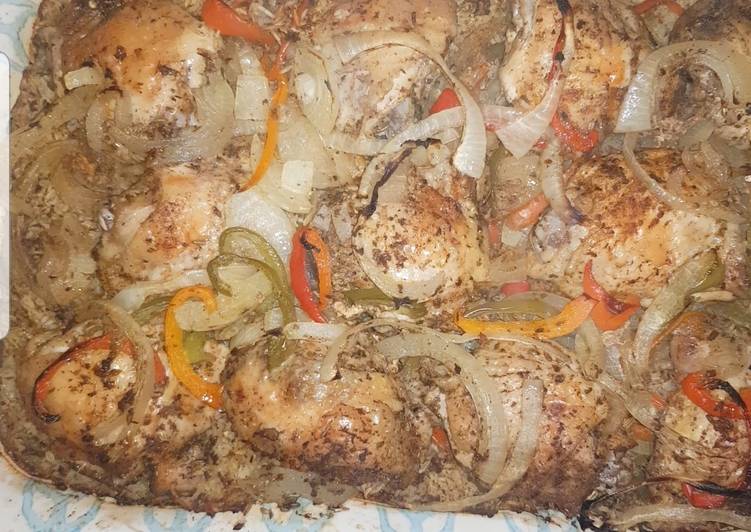
Hello everybody, hope you are having an amazing day today. Today, I’m gonna show you how to prepare a special dish, galbitang - korean beef short rib soup. One of my favorites. This time, I will make it a bit unique. This is gonna smell and look delicious.
Beef short ribs are an expensive cut of meat, so this soup is considered a luxury among Korean soups and often served for special occasions such as Galbitang is fairly simple to make. However, you need to know a few tips to give the soup the nice, clean taste it's known for. Beef short ribs, daikon radish, eggs, garlic, green onion, ground black pepper, korean radish, onion, starch noodles.
Galbitang - Korean Beef Short Rib Soup is one of the most favored of current trending foods on earth. It’s easy, it is fast, it tastes delicious. It’s enjoyed by millions every day. Galbitang - Korean Beef Short Rib Soup is something which I have loved my entire life. They are fine and they look wonderful.
To begin with this particular recipe, we must prepare a few ingredients. You can have galbitang - korean beef short rib soup using 12 ingredients and 6 steps. Here is how you cook that.
The ingredients needed to make Galbitang - Korean Beef Short Rib Soup:
- Get 500 g beef short ribs, membranes removed
- Prepare 1 onion, cut into large chunks
- Prepare 250 g Korean radish, peeled (am not using it cos I can’t find it in my local asian shop)
- Get 3 spring onions, white part
- Take 2 garlic cloves, peeled
- Get 10 whole black peppers
- Make ready 10 cups water
- Prepare Seasonings :
- Get 1 1/2 tbsp light soy sauce
- Prepare 1 tbsp minced garlic
- Get 2 tsp sea salt or more to taste
- Get to taste Ground black pepper
My mom used to make galbitang for special occasions, because galbi, beef short rib is very expensive in Korea! In a serving bowl, place soften glass noodles if you prepared, and place sliced radishes. Beef Short Rib Soup or Galbitang is a great tummy warming soup that is simple and easy to make. Since Korean Beef Short Rib Soup must be cooked for several hours, the whole house will eventually be filled with the wonderful and mouthwatering aroma of beef soup.
Instructions to make Galbitang - Korean Beef Short Rib Soup:
- Soak the beef ribs in cold water for 20 mins. Change the water a few times during this time. This is to draw out the red liquid (which looks like blood) from the meat and also to rinse out any bone fragments.
- In a large pot of boiling water (enough fo fully cover the ribs), boil the ribs for 10 minutes over medium heat. Drain the water and rinse the ribs in cold water. Cut off any obvious excess fat from the ribs.
- Place them in a large clean pot. Add onions, spring onions, garlic, black peppers and water (10 cups) into the pot and bring them to boil over medium high heat, covered. Once boiling, reduce the heat to medium low and simmer for 1.5 hours.
- Gently take out the beef ribs from the broth and set them aside. Strain the remaining ingredients over another clean pot. Discard all the strained vegetables while keeping the broth. Remove the fat.
- Season the beef ribs with the seasoning ingredients and gently place them into the pot. Bring the pot to boil over medium high heat for about 10 minutes.
- Serve the soup with cooked rice and kimchi.
Galbitang is served as the main entree for a meal. Put the parboiled cleaned ribs into the clean Instant Pot. Add in the other main ingredients - garlic, onion, scallions, Korean radish, whole black. Galbitang is a hearty Korean soup made with beef short ribs, Korean radish, and starchy noodles that's perfect for a comforting dinner. We made another slow-simmering beef soup last night called galbitang, which includes beef short ribs, Korean radish (mu), and glass noodles (dangmyun).
So that’s going to wrap it up with this exceptional food galbitang - korean beef short rib soup recipe. Thank you very much for your time. I’m sure that you can make this at home. There is gonna be more interesting food at home recipes coming up. Remember to save this page in your browser, and share it to your loved ones, friends and colleague. Thanks again for reading. Go on get cooking!


